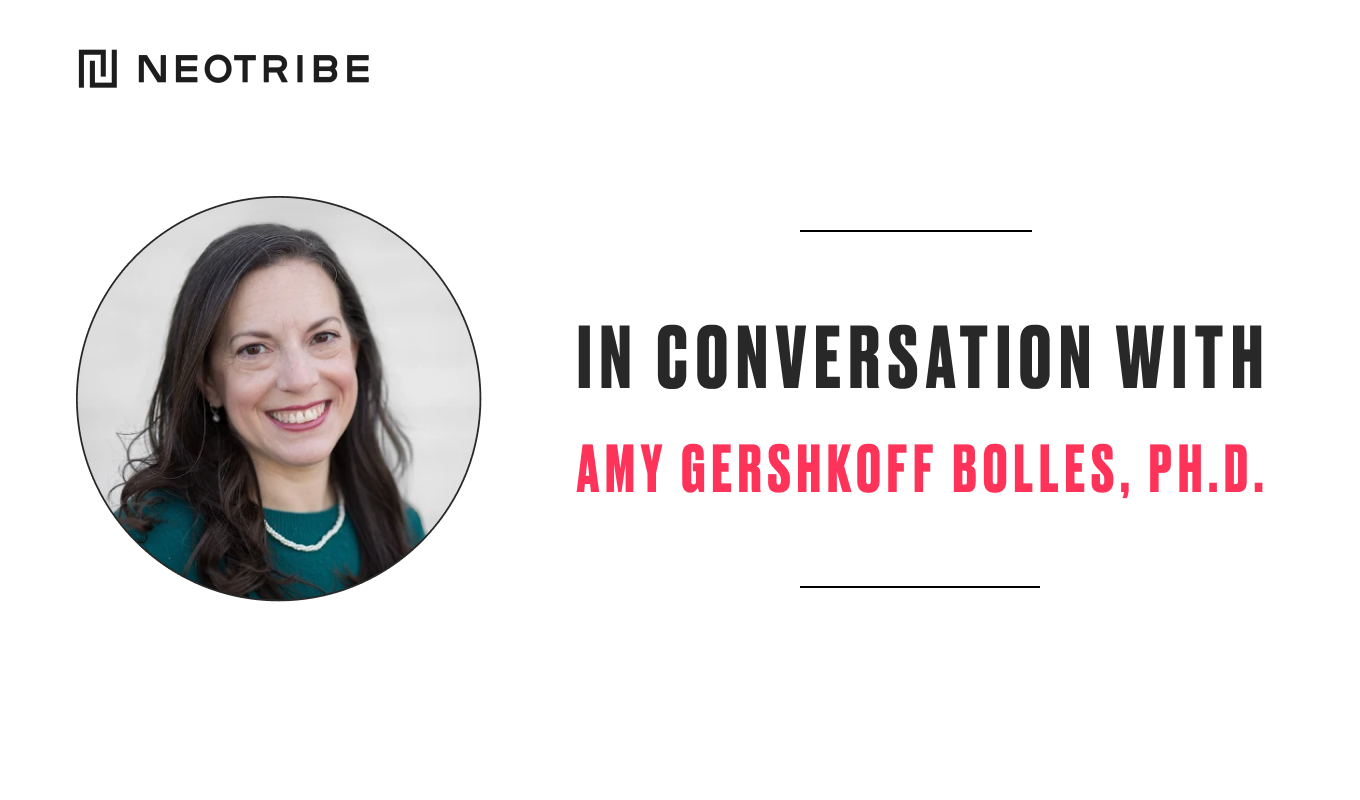Straight Talk, Operational Excellence: Meet Neotribe’s Newest Advisor, Amy Gershkoff Bolles
Our newest advisor, Amy Gershkoff Bolles, joins Nitin Chopra for an interview to share learnings from her experiences ranging from startup founder to Fortune 500 operator to public company board member to PE and VC investor.

As part of Neotribe’s pursuit of excellence, we engage with technology leaders and industry advisors whose knowledge and experience can help our investors and portfolio companies succeed. Our latest advisor is Amy Gershkoff Bolles, Ph.D.—a seasoned CEO, COO, Board Director, Founder, Investor, Advisor, and Public Speaker with a proven track record of building & leading high-performing teams. Amy has held executive roles with eBay, Zynga, Levi Strauss & Co., WPP, and the Obama for America campaign, and led two companies to successful exits. I recently sat down with Amy to uncover what makes her tick, how she looks at tech startup growth and what she can offer the Neotribe community in her advisory role.
Interview
1. Nitin: Tell me about yourself. “Who is Amy Gershkoff Bolles?”
Amy: I’m an executive who believes that data and technology should enable every aspect of a business. As a founder, CEO, COO, executive, board director, advisor, and investor for organizations from early-stage start-ups to large public companies, I’ve worked to unlock growth, improve profitability, and streamline operations. I led two companies to successful exits. But what I’m most proud of are the teams I’ve built. I try to hire for potential, not just experience, and give opportunities to people from non-traditional backgrounds. What I have found is that diverse teams of talented people with different perspectives spark creativity and unlock tremendous value for the enterprise.
2. Nitin: How do you decide what companies to engage with?
Amy: I evaluate board director, advisor, and investor opportunities along three dimensions:
- Does the company, management team, and board align with my values?
- Do I see a clear strategy for the company to unlock significant value in the next 5 years?
- Do I see clearly how I am additive to this strategy?
If the answer is “yes” to all three, I may be interested in being involved, regardless of the size or stage of the company. My involvement may look very different in each case, however. For an earlier stage company, I might provide strategic guidance on product development or go-to-market. For a later stage company, I might help run due diligence on a potential M&A opportunity or advise on board composition.
3. Nitin: What are the things that you really care about when you help a company at any stage of development? What is the “Amy Gershkoff Bolles” way?
Amy: Regardless of size or stage of the company, my guidance to CEOs is usually to prioritize: Commit to fewer initiatives, invest more capital and human resources in them, and complete them on time and on budget. I always believe in building a culture of operational excellence: “Say what you’ll do, and do what you say.” Without execution, strategy is just talk.
4. Nitin: It’s an election year, and you ran data and marketing for Obama for America in 2012. How did that help you in your subsequent roles?
Amy: A presidential campaign is equivalent to a Fortune 500 company—it has a budget of billions of dollars and tens of thousands of staff. But unlike a Fortune 500 company, there is a clear finish line in a campaign—Election Day is written in the Constitution! By the time that day arrives, your aim is to be bankrupt: every last dollar should have been spent winning votes. I’ve strived to bring this same sense of urgency and discipline to business organizations. I’m known for being on-time and on-budget because my political campaign experience taught me to allow additional time and capital for unforeseen challenges and unplanned expenditures. The constraints of an immovable deadline and inflexible budget also compelled me to think differently about talent: I hire people on the basis of their creativity and resilience—as if the fate of the nation depends upon it.
5. Nitin: What are the common mistakes that you see technology startups make? What advice do you have for tech start-ups selling to traditional enterprise sectors?
Amy: Many technical founders want to talk about the details of the technology in sales conversations. While going into some explanation of the tech is important to closing a sale, it shouldn’t go much deeper technically than the person they are selling to is capable of or interested in understanding. You have to know your audience. On the other hand, many technical founders fail to adequately explain the business case that’s most germane to closing the sale. There is so much competitive pressure on margin in most enterprises, it’s absolutely crucial to make clear how your solution will affect the bottom line in terms that the CFO or another financial or business leader can easily and immediately understand.
6. Nitin: Tell me about your work at Neotribe. How do you describe your role with us?
Amy: In addition to my “day job,” advising provides a way to stay current on the latest market trends and give back by advising other founders. My advisory role at Neotribe allows me to add value throughout the investment lifecycle. I’m always on the lookout for early-stage, transformational technology companies on a strong growth trajectory to introduce to the Neotribe investment team. I sometimes then assist Neotribe with technical, commercial, and financial diligence. I also occasionally provide strategic advice to companies within the Neotribe portfolio—serving as a sounding board for product development, sales and marketing, operations, or strategy.
7. Nitin: One of the initiatives you are helping us with is our expert network of enterprise tech leaders who give our portfolio companies market feedback. Why is having a technology advisory network so important?
Amy: Expert networks are really a three-sided marketplace, usually consisting of an investment firm, their portfolio companies, and corporate strategic partners. Over the years, I’ve been part of several such networks, and I’ve seen first-hand the value they bring to all three sides. The corporate strategic partners get early access to companies at the forefront of technology innovation and learn how their corporate peers are leveraging emerging technologies. The investors get to learn first-hand from the corporate partners what challenges and opportunities they are facing, plus map that knowledge to investments. And the portfolio companies get privileged access to meaningful customer intelligence they can use to improve their solutions.
8. Nitin: Finally, the quintessential interview question: What is in store for you in the future, Amy? Where do you see yourself in five years?
Amy: I’m currently in discussions about a number of opportunities to lead a company through their next phase of profitable growth, drawing on my expertise in talent, strategy, and operations. I’m having some exciting conversations—looking forward to sharing more soon!

